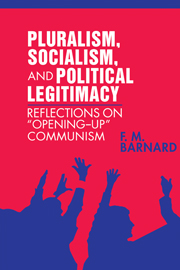Book contents
- Frontmatter
- Contents
- Preface
- 1 Introduction
- 2 The Context
- 3 Socialist pluralism and pluralist socialism
- 4 Ideological differentiation under socialism
- 5 Socialism and the language of sentiment
- 6 Socialism and the language of rationality
- 7 Socialism, politics, and citizenship
- 8 Conclusion
- Appendix: Electoral confrontation under socialism
- Index
2 - The Context
Published online by Cambridge University Press: 25 January 2010
- Frontmatter
- Contents
- Preface
- 1 Introduction
- 2 The Context
- 3 Socialist pluralism and pluralist socialism
- 4 Ideological differentiation under socialism
- 5 Socialism and the language of sentiment
- 6 Socialism and the language of rationality
- 7 Socialism, politics, and citizenship
- 8 Conclusion
- Appendix: Electoral confrontation under socialism
- Index
Summary
Impressive by any standard of debate anywhere, the ferment of ideas in Czechoslovakia during the late 1960s was truly unique for a Communist-ruled country, in both extent and intensity. Extending over such diverse subjects as science, art, linguistics, law, literature, technology, economics, and politics, the debate involved a probing that left no hallowed belief or practice immune to review. Matters presumed to be settled were reopened, and no iniquity or mere bungling was safe from discovery. The first eight months of 1968 stand out in particular as an era of questioning of almost unprecedented proportions.
Humane socialism: Marxism and Masarykism?
It is tempting to think that these events render convincing proof of the working of historical continuity, in that they bear witness to the resilience of Czechoslovakia's democratic traditions of the interwar period. Few commentators could in fact resist this temptation, both within Czechoslovakia and abroad. I fear I cannot quite share this faith in historical continuity. Too many occurrences since 1938, and particularly since 1948, speak against it. But to question the historical continuity of a single pervasive culture of politics is not to deny causal relevance to the past. Humans may be the authors of their history, but no one, as Marx qualifiedly reminds us, creates the stuff of history out of whole cloth. However man may wish to transcend and transform the present in order to create something new, he cannot dispense with categories and concepts of the past. He cannot, as Marx puts it, be totally oblivious of the traditions of past generations; they enter our very being and “weigh heavily upon our thinking.”
- Type
- Chapter
- Information
- Pluralism, Socialism, and Political LegitimacyReflections on Opening up Communism, pp. 21 - 46Publisher: Cambridge University PressPrint publication year: 1992



